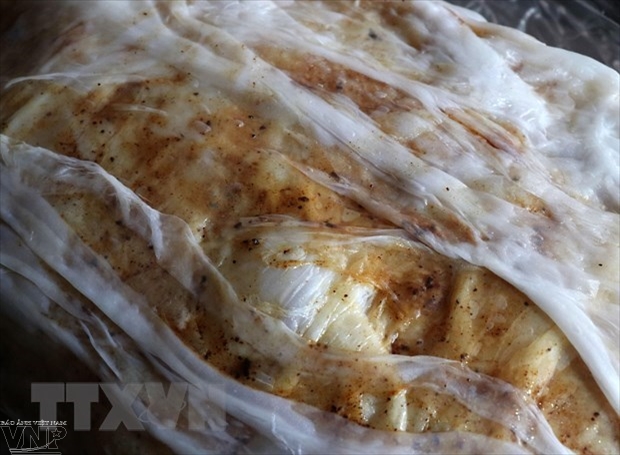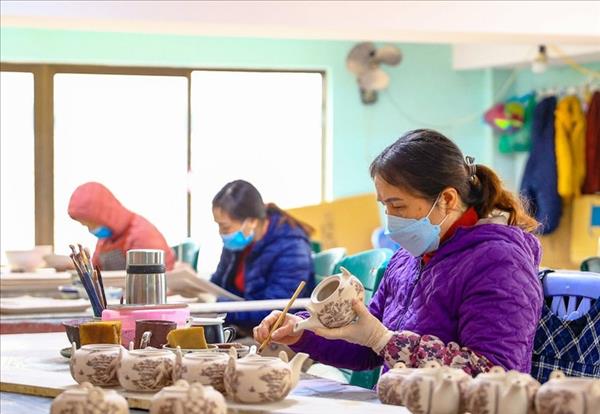 |
| The Mao Dien rolled rice pancake is special for the sprinkling of fried onion flakes on it. Photo: VNA |
Mao Dien commune in Thuan Thanh district, the northern province of Bac Ninh, is renowned for its top students, barley-sugar and the delicious “banh cuon” – steamed rolled rice pancakes.
None of the local residents remember when the dish dates back to. They only know that it is a long-standing tradition that has been passed down from generation to generation.
In the past, the production mainly involved women. “Banh cuon” was made by hand, and required many stages of preparation.
The eye-catching thing about the pancakes is fried opinion flakes, so preparing the topping is meticulous work. Firstly, the skin of the onions, more specifically shallots, is removed, and then they are washed and fried until they release pleasant fragrance. Later, the fried onions are ground up, and then sprinkled over the pancakes when they are cool.
Previously, local women had to select the best rice grain, soak them in water for several hours, grind the soaked rice in a stone mill, and filter the mixture of rice and water to remove any sourness before applying a thin layer of the liquid to a cloth atop a pot of boiling water to steam.
To make a basket of 35 – 40kg of “banh cuon”, people had to work continually for 5 – 6 hours. All the steps required care, patience and speed.
Every day, at 2-3am, local women began carrying “banh cuon” to villages and markets far and wide to ensure people had a delicious breakfast to start the new day.
Making “banh cuon” was a strenuous work but did not generate much income. Locals had to use by-products like unwanted dough or rice bran to farm pigs to improve their families’ incomes.
In recent years, machinery has been used in the production process, helping to raise the productivity by 10 – 20 times compared to the manual method, while saving effort, time and materials.
Mao Dien commune is now equipped with 12 modern machines which produce “banh cuon” for more than 200 households to sell. Each machine produces 350 – 400kg of “banh cuon” per day in winter and 600 – 700kg per day in summer, generating 7 – 8 million VND (300 – 340 USD) in profit every month.
Whether the food is sold well or not depends on each person’s sales skills. Each household can sell from 50 – 70kg to 200 – 300kg of “banh cuon” a day, earning an average monthly income of 2 million – 9 million VND.
To meet consumers’ growing demands, residents in Mao Dien now produce two types of “banh cuon”, one with fried onion flakes and another with wood ear mushroom. The dish is now sold not only in Bac Ninh province but also other localities.
A number of famous restaurants in Hanoi and the nearby provinces of Hung Yen and Hai Duong sell the famed specialty of Mao Dien. Enjoying this dish, many people confuse it with “banh cuon Thanh Tri” (Thanh Tri rolled rice pancakes), which is a popular delicacy of Hanoi.
Vu Van Manh, Vice Chairman of the People’s Committee of Mao Dien commune, said “banh cuon” has long been an indispensable gift for every visitor to Mao Dien. Realising the economic effectiveness of producing “banh cuon”, many local households have expanded production and made the dish better known among consumers in Bac Ninh and other localities.
There are about 200 households producing and doing business in rolled rice pancakes in the commune, creating jobs for hundreds of people with an average per capita income of 5 billion – 6 million VND each month.
However, he admitted, the craft is also facing numerous difficulties, especially in terms of manpower, as experienced makers are becoming fewer and fewer while most young people choose other jobs to follow.
Besides, “banh cuon Mao Dien” has yet to have its own trademark, so advertising the dish to consumers in other localities remains modest, Manh noted.
Facing this fact, the local administration has devised several solutions to maintain and develop the craft, including boosting communications to raise residents’ awareness of ensuring food safety, improving product quality and teaching the younger generation how to make the pancakes. It is also coordinating with relevant agencies to build a trademark for the specialty and ensure stable sales.
In the short term, authorities will continue to promote the dish to visitors in Bac Ninh who will become “ambassadors” and help to popularise the local delicacy far and wide, the official added.
VNA/VNP

















